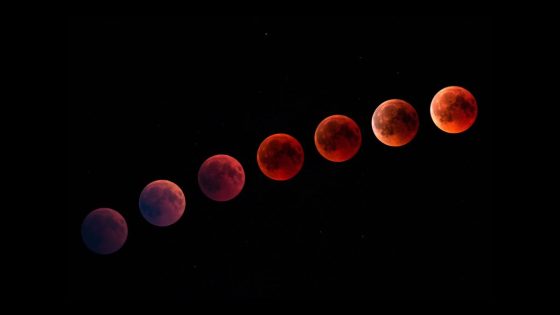The next total lunar eclipse will occur overnight on March 13-14, 2025. This event marks the first total lunar eclipse since November 2022. Are you ready to witness the captivating transformation of the moon into a stunning “Blood Moon”? This rare celestial phenomenon will be visible across North America and much of South America, offering a spectacular view for many.
- Next total lunar eclipse: March 13-14, 2025
- First total lunar eclipse since November 2022
- Visible in North America and South America
- Moon appears red during total lunar eclipse
- Known as "Blood Moon" phenomenon
- Resources available for lunar eclipse photography
What to Expect During the Total Lunar Eclipse in 2025
Have you ever wondered what happens during a total lunar eclipse? As the Earth passes between the sun and the moon, the moon takes on a reddish hue. This stunning visual is not only beautiful but also a great opportunity for stargazers and photographers alike.
Viewing Tips for the Total Lunar Eclipse in North America
To make the most of this extraordinary event, consider these tips:
- Find a dark location away from city lights.
- Use a camera with a zoom lens for stunning photos.
- Bring binoculars or a telescope for a closer look.
- Gather with friends or family to share the experience.
Understanding the “Blood Moon” Phenomenon
The term “Blood Moon” refers to the reddish appearance of the moon during a total lunar eclipse. This color change occurs due to Earth’s atmosphere filtering sunlight. Have you ever seen a sunset? The same effect happens here, creating a beautiful, eerie glow that enchants viewers.
How to Photograph a Lunar Eclipse Effectively
Capturing the beauty of a lunar eclipse can be rewarding. Here are some tips to help you take stunning photos:
- Use a tripod for stability.
- Adjust your camera settings for low light.
- Experiment with exposure times for different effects.
- Practice beforehand to ensure you’re ready on the big night.
Why Lunar Eclipses Matter to Astronomy Enthusiasts
Lunar eclipses are significant for both amateur and professional astronomers. They provide a unique opportunity to study the moon’s surface and the Earth’s atmosphere. Are you curious about the science behind these celestial events? Observing a lunar eclipse can deepen your understanding of our solar system and its wonders.
As the total lunar eclipse approaches, excitement builds. Mark your calendars for March 13-14, 2025, and prepare for a night of wonder under the stars!
































